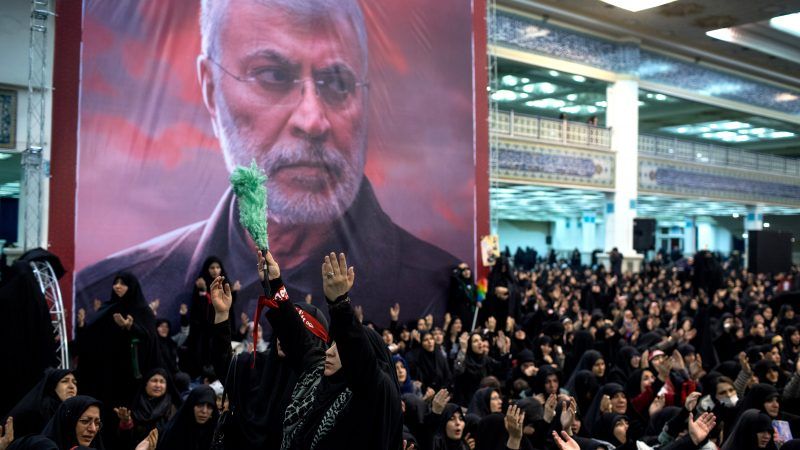Who Poses the Greater Threat to Peace: An Impetuous President or 'Experienced Advisers' Who Are Disastrously Wrong?
History shows that expertise is not the same as wisdom.

"The moment we all feared is likely upon us," Sen. Chris Murphy (D–Conn.) warned after the American drone attack that killed Iranian military commander Qasem Soleimani. "An unstable President in way over his head, panicking, with all his experienced advisers having quit, and only the sycophantic amateurs remaining." The problem, as Murphy sees it, is a lack of "adults in the room" to curb the dangerous, bloodthirsty impulses of an inexperienced and impetuous president. Yet history suggests that the foreign policy professionals Murphy misses are at least as grave a threat to peace.
While running for president in 2000, George W. Bush derided "nation building" and said American foreign policy should be "humble" rather than "arrogant." As president, Bush brought us the disastrous wars in Afghanistan and Iraq, countries where thousands of U.S. troops remain 19 and 17 years later, respectively.
While running for president in 2007, Barack Obama rejected the idea that the president has the authority to wage war without congressional authorization whenever he thinks it is in the national interest. "The President does not have power under the Constitution to unilaterally authorize a military attack in a situation that does not involve stopping an actual or imminent threat to the nation," he explained. As president, Obama did that very thing in Libya, another ill-advised and mendaciously justified intervention that begat chaotic violence.
A few years before his 2016 presidential campaign, Donald Trump said the U.S. should withdraw immediately from Afghanistan, where "we have wasted an enormous amount of blood and treasure." He also worried that "Obama will someday attack Iran in order to show how tough he is." While running for president, Trump unequivocally condemned the Iraq war and the U.S.-supported toppling of Libyan strongman Moammar Gadhafi. As president, he sent more troops to Afghanistan, became so committed to staying in Iraq that he is threatening the Iraqi government with sanctions for asking the U.S. to leave, and now may be courting war with Iran for reasons similar to the ones he thought would motivate Obama to launch one.
Three men with little or no foreign policy experience entered an office where they were surrounded by experts, and they quickly shed their initial skepticism of military intervention. If you think that skepticism was naive, that was a welcome development. But the consequences suggest otherwise.
The conflict between Trump's pre-presidential inclinations and the expert advice he received after taking office was clear in the case of Afghanistan and Syria, where the "adults in the room" passionately, and for the most part successfully, resisted his efforts at disengagement. Even in the case of Iran, where it was Trump who decided that killing Soleimani was a good idea, that was one of the options his military advisers presented, apparently in an attempt to manipulate him.
"Top American military officials put the option of killing [Soleimani]—which they viewed as the most extreme response to recent Iranian-led violence in Iraq—on the menu they presented to President Trump," The New York Times reports. "They didn't think he would take it. In the wars waged since the Sept. 11, 2001, attacks, Pentagon officials have often offered improbable options to presidents to make other possibilities appear more palatable."
The Times says those military officials were "flabbergasted" by Trump's choice and "immediately alarmed about the prospect of Iranian retaliatory strikes on American troops in the region." If so, the president's "experienced advisers," the ones Chris Murphy thinks should be restraining him, played a dangerous game that backfired on them.
Experience is not necessarily the same as wisdom. Hillary Clinton, who boasts an impressive résumé that includes eight years as a senator and four as secretary of state, thinks Obama's intervention in Libya was "smart power at its best," and she did not publicly acknowledge the folly of the Iraq war, which she voted to authorize, until 11 years after it was launched. The histories of the U.S. wars in Afghanistan and Vietnam dramatically illustrate how smart, knowledgeable people can make catastrophic blunders and lie for years to cover them up.
Former National Security Adviser John Bolton and former Defense Secretary James Mattis, both of whom seem to have resigned because they viewed Trump as insufficiently interventionist and/or excessively skeptical of existing entanglements, surely would count as "experienced advisers." That does not mean their advice was sound. Bolton, for his part, welcomed the killing of Soleimani as "a decisive blow against Iran's malign Quds Force activities worldwide."
Murphy is right that we should worry about a president with little knowledge of the world whose military decisions are driven by anger or domestic political considerations. But it's not clear to me that such a president poses a bigger danger than the experts who have been disastrously wrong more times than we can count.
[This post has been revised to note Bolton's endorsement of the drone attack that killed Soleimani.]


Show Comments (138)